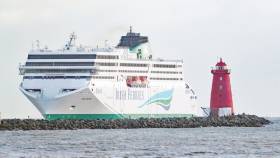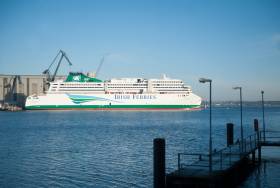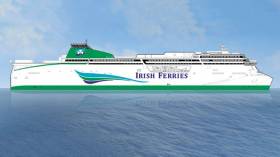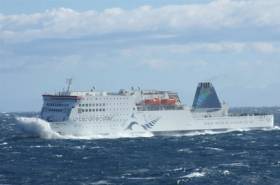Displaying items by tag: ICG
Increased Revenue at Irish Ferries Following Disruptions in 2018
Irish Continental Group, the parent company of Irish Ferries has reported revenue of €308.8m in the first ten months of 2019, an increase of 8.2pc on the same period last year.
As the Independent.ie writes, ICG said a "significant" proportion of the improvement came from the ferries division, on the back of improved scheduling reliability following major disruptions in 2018.
Despite this, it experienced "some volatility in carryings as key Brexit dates were approached and subsequently postponed".
The overall effect of this continuing uncertainty "is generating negative impact on consumer sentiment and trade flows as investment decisions are delayed".
For further reading click here.
Improved Revenue Growth at Irish Continental Group
Maritime transport operator, Irish Continental Group has reported revenue 6% higher for the half year, following the introduction of the WB Yeats cruise ferry on schedule services with Irish Ferries in January.
Earnings per share, reports RTE News, however, were down 16% to 12.8 cent. ICG reported its interim dividend increased by 5% to 4.42 cent.
The company is concerned about the impact of Brexit but says it can pursue other opportunities, and remains confident for continued revenue growth.
ICG sold the Oscar Wilde ferry in April for €28.9 million, following the sale, a year earlier, of the Jonathan Swift for €15.5 million.
Fuel costs increased by €3.1 million to €25.5 million in the six month period.
Click here for more on this story.
The Irish Continental Group (ICG) has said it is totally prepared to meet the challenges posed by Brexit, whatever way those challenges emerge.
At the group’s annual general meeting, John McGuckian, ICG chairman, said, “we’re confident that whatever happens, we will react in an efficient and profitable way”.
Speaking to The Irish Times after the meeting, ICG chief executive Eamonn Rothwell said he’d prefer if sterling wasn’t so weak but he didn’t show concern on the basis that he doesn’t “know what Brexit is yet”. Mr Rothwell added that he doesn’t expect the group to suffer as 40 per cent of travellers on the Irish Sea are travellers originating in Ireland, while the remainder are British.
At the group agm there was no opposition to any of the resolutions, with remuneration practices in the company supported by over 90 per cent of shareholders. The shareholders dividend of 7.76 cent per share was also approved at the meeting. That dividend will be paid in June.
For more including the sale in 2017 of the former Isle of Innisfree (Kaitaki) to a New Zealand operator and results on ICG's ro-ro operations click here.
Profits Sink at ICG after Ferry Schedule Disruptions
#ferries - The Irish Continental Group has reported lower revenues and profits for 2018 on the back of disruption to its ferry schedules and higher fuel costs, writes RTE News.
Revenues at ICG, which owns Irish Ferries, slipped by 1.5% to €330.2m from €335.1m in 2017 while EBITDA fell by 15.6% to €68.4m from €89m
The company's adjusted earnings per share sank over 31% to 30.4 cent in 2018 from 44.1 cent the previous year, while its operating profits slumped by 32.6% to €60m from €89m.
Its fuel costs during the year increased by 19.6% to €48.2m.
During the year Irish Ferries encountered "technical difficulties" with its Ulysses ferry, while it also saw the late delivery of its new WB Yeats ferry. This ferry had been scheduled to start sailing last summer but only entered service in January of this year.
Operating initially on the Dublin-Holyhead route, it is due to switch to the Dublin-Cherbourg route in March.
For more including comment from ICG's chairman, click here.
#FerryNews - Ferry and container shipping company, Irish Continental Group (ICG) has set aside space for a post-Brexit duty-free shop on its new passenger ferry, the WB Yeats (see sea trials).
As The Irish Times reports, Brussels ended duty-free shopping for those travelling between European Union member states in 1999, despite lobbying from the Republic. However, it could return on journeys to the UK depending on the nature of its exit deal.
ICG, owner of Irish Ferries, is one of a number of companies that believes the UK’s exit from the EU next April could herald a return of tax- and excise-free shopping for travellers between that jurisdiction and the Republic.
The group has set aside space for duty-free retailing in a shop on the upper floor of its newest ferry, the €144 million WB Yeats, in case low-cost alcohol, tobacco and perfume make a return following Brexit. The newbuilt cruiseferry as Afloat also reported today is due to operate on the daily Dublin to Holyhead route.
For more from the newspaper on the duty-free development, click here.
Profits at ICG, Owners of Irish Ferries Almost Halve
#FerryNews - Profits in Irish Continental Group (ICG) almost halved to €29.7 million in the six months ended June 30, the latest figures show.
As The Irish Times reports, ICG whose ferry division Irish Ferries, saw revenue grew slightly to €157.2 million from €156.1 million in the first half of the year.
Profit before tax fell 46 per cent to €29.7 million from €47.5 million during the same period last year.
Earnings per share fell 33 per cent to 15.3 cent in the six months ended June 30 from 22.8 cent in the first half of 2017.
Total equity rose 55 per cent in the period to €240.3 million from €191.3 on June 30 last year.
For more on the financial results, click here.
#FerryNews - Irish Ferries parent company, Irish Continental Group (ICG) said its revenues rose by 1.4% to €96.4m in the first four months of the year.
A trading statement from the company reported an increase in its consumer and freight business during the period.
But ICG said it had taken a €2.5m revenue hit relating to the delay in the arrival of its new WB Yeats ferry.
The ferry had been due to start sailing on the Dublin-Cherbourg route on July 12, but the company making the vessel said its delivery would be delayed which resulted in ICG cancelling a number of sailings.
For more from RTE News click here.
#Ports&Shipping - Irish Continental Group (ICG) operates in two divisions; Irish Ferries which offers passenger and roll-on roll-off (ro-ro) freight services and the container and terminal divisions.
ICG issued today results for the year ended December 31st 2017 (see related coverage).
Afloat adds ICG's shipping container subsidiary, Eucon provides a lift on/lift off (lo-lo) service between Ireland and mainland Europe, connecting the ports of Dublin, Cork and Belfast, with Antwerp, Belgium and Rotterdam, The Netherlands.
Below is a summary extract and results only regarding the container and terminal divisions.
For complete results of the Irish-based maritime transport group, click HERE.
Revenue in container division increased to €131.9 million (2016: €123.9 million).
The revenue is derived from container handling and related ancillary revenues at our terminals and in Eucon from a mix of domestic door-to-door, quay-to-quay and feeder services with 69% (2016: 70%) of shipping revenue generated from imports into Ireland.
Operating with a flexible chartered fleet and slot charter arrangements Eucon was able to adjust capacity and thereby continue to meet the requirements of customers in a cost effective and efficient manner. EBITDA in the division increased to €13.7 million (2016: €12.8 million) while EBIT rose 8.7% to €11.2 million (2016: €10.3 million).
Overall, Eucon container volumes shipped increased by 5.9% compared with the previous year to 321,400 teu (2016: 303,600 teu). The resulting revenue increase was partially offset by a €2.9 million increase in fuel costs.
Containers handled by the Group’s terminal operations in Dublin Ferryport Terminals (DFT) and Belfast Container Terminal (BCT) rose by 3.0% at 296,800 lifts (2016: 288,100 lifts).
DFT’s volumes grew by 4.7%, while BCT’s volumes increased by 0.7%.
Containership fleet review operations.
The container vessel MV Ranger remains on time charter to a third party and is currently trading in north-west Europe. The MV Elbtrader (pictured above) MV Elbcarrier and MV Elbfeeder remain on time charter to Eucon.
#FerryNews - Fuel costs increased and a weaker sterling led earnings at Irish Ferries owner Irish Continental Group (ICG) to fall 3 per cent, results for the year ended December 31st 2017 show.
As The Irish Times reports, despite revenue growth of 3 per cent to €335.1 million on the back of volume growth across the group’s operations, earnings before interest, taxes, depreciation and amortisation fell to €81 million.
Company chairman John B McGuckian flagged the year as a successful one before noting group fuel costs increased by 25.2 per cent to €40.3 million.
Early in the financial year Irish Continental sold its MV Kaitaki which yielded a profit after tax of €24.9 million. Early this year the company sold its Jonathan Swift vessel.
Additionally, the company entered into an agreement this year for a new ferry, which will cost €165.2 million, that will be delivered to the group in 2020 and will be used on the company’s Dublin to Holyhead services.
Although the company’s EBITDA performance won’t thrill shareholders, it was ahead of analyst expectations while profit before tax increased by 45 per cent to €87.8 million. Additionally, the company has moved from a €37.9 million net debt position in 2016 to a net cash position of €39.6 million last year.
Irish continental operates in two divisions; the ferries division which offers passenger and roll-on roll-off freight services, and the container and terminal division.
Despite Brexit associated headwinds, the overall car market to and from the Republic of Ireland grew by around 1.7 per cent in 2017 to 807,400 cars.
Irish Ferries’ car carryings “performed strongly”, up 2.4 per cent to 424,000 cars. The company carried 1.65 million passengers in the period, up 1.7 per cent, thus outperforming growth in the wider market where numbers edged up 1 per cent to 3.13 million passengers.
For more click here.
#FerrySale - Irish Continental Group has issued a statement yesterday to confirm the car ferry "Kaitaki" has been delivered to buyers KiwiRail of New Zealand.
ICG agreed consideration of €45.0 million, payable in cash, has been received in full and will be utilised for general corporate purposes.
Afloat adds the 21 year-old vessel has been on charter since 2002 and the majority of that time spent operating on the Cook Strait service. The ferry link connects Wellington on the North Island to Picton on the South Island.
The news follows an announcement by ICG in mid-May of the sale of the former Irish Ferries operated Isle of Innisfree that was custom-built in 1995 to serve a career on the Irish Sea.
Such investment in new tonnage, was badly needed following the acquisition by ICG of the ailing State owned and under-funded B&I Line in 1991.
The British & Irish Steam Packet Co. was established in 1836. Public ownership through the State in 1965 followed the purchase of share capital from Coast Lines Ltd.


























